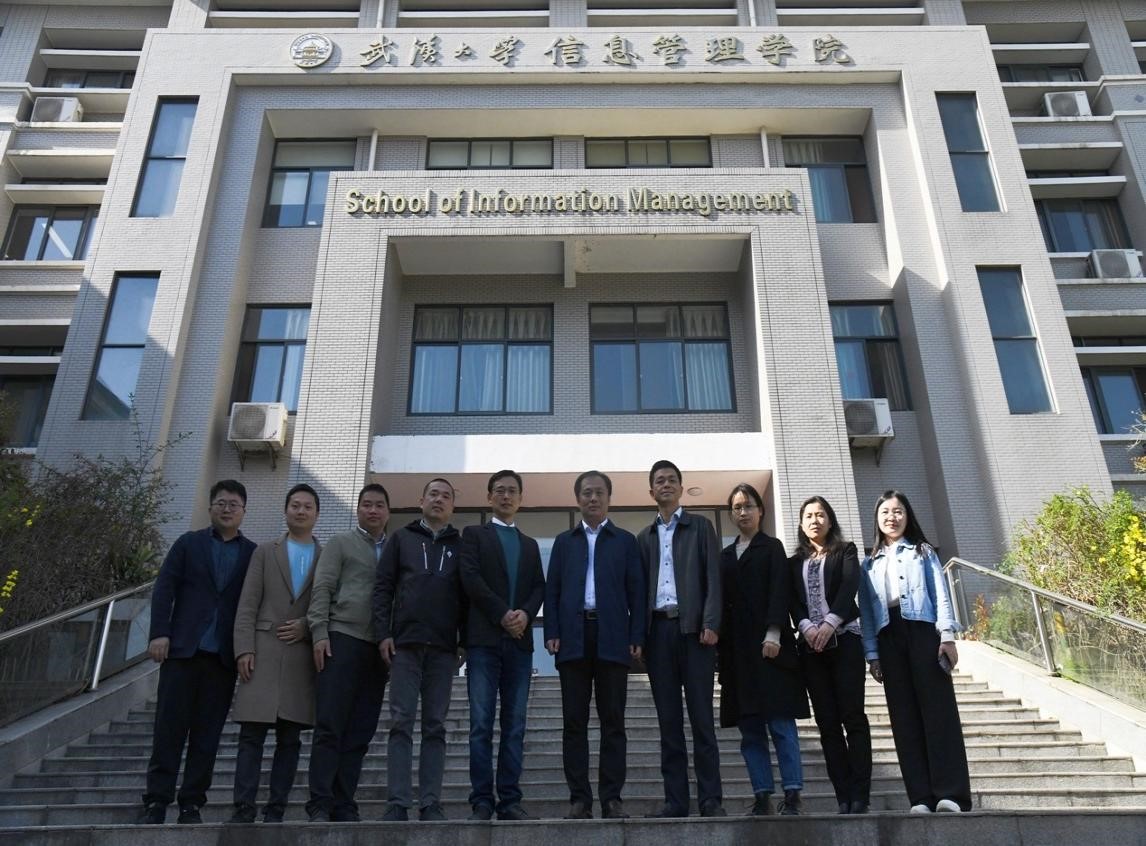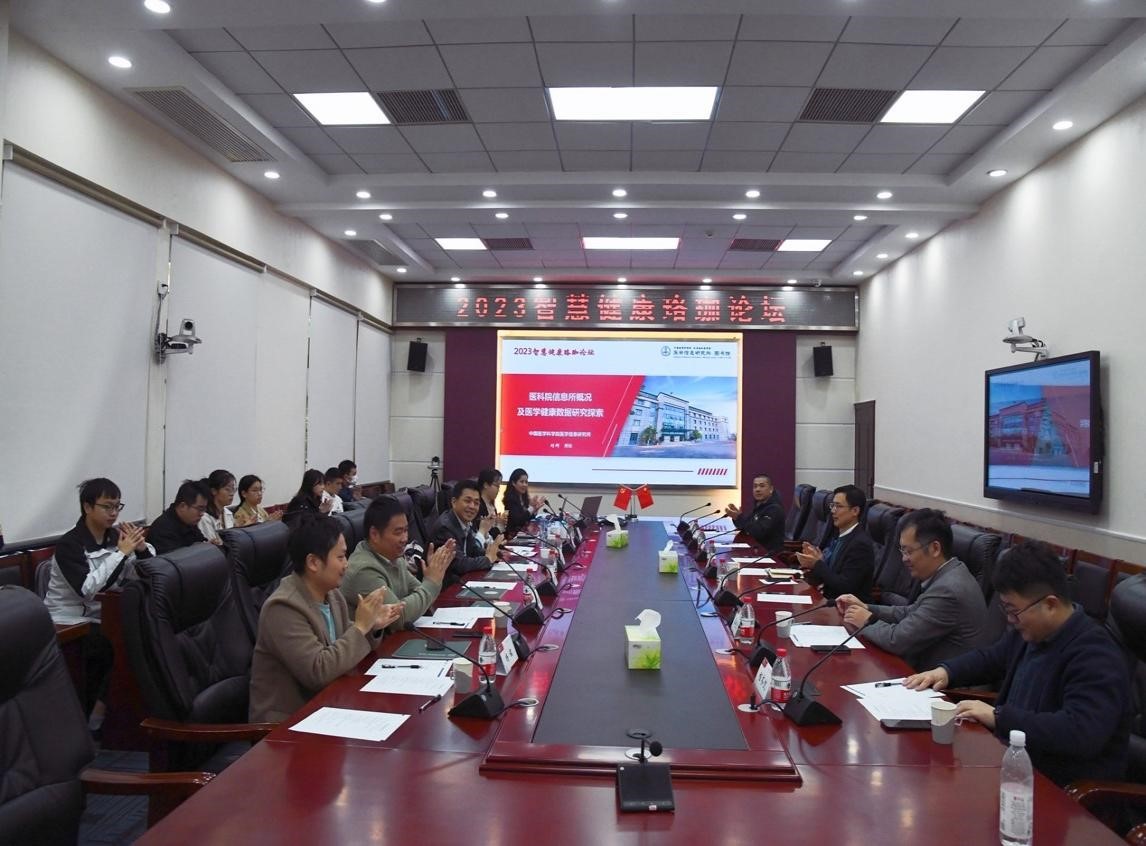The 2023 Luojia Forum on Smart Health was held at our School on March 14. It was hosted by our School and co-organized by the Information Retrieval and Knowledge Mining Laboratory of Wuhan University.

The Forum focused on Digital Intelligence Empowering Medical and Health Service.
People attended the Forum were as followings:
Zhiguang Zhao, Deputy Director of Shenzhen Center for Chronic Disease Control,
Xiaoying Li, Assistant Researcher of the Institute of Medical Information, Chinese Academy of Medical Sciences and Peking Union Medical School,
Wenwei Ma, Algorithm R&D Expert of Taikang Online Property Insurance Co., Ltd.,
Jun Tao, Associate Dean of the Academy of Humanities and Social Sciences, Wuhan University,
Wei Lu, Dean of our School,
Xiaoguang Wang, Associate Dean of our School,
Quan Lu, Director of the Department of Information Management Science of our School.
Qikai Cheng, Deputy Director of the Information Retrieval and Knowledge Mining Laboratory of Wuhan University, presided over the Forum.
In his speech, Jun Tao said that under the background that medical and healthcare big data has become a national strategic resource, the School of Information Management in Wuhan University has integrated computing science and social science deeply, and strive to provide intelligent, portable and personalized service for medical and healthcare field by using intelligent technology. He hoped that the smart health research by the School should adhere to the four orientations, integrate advanced technologies such as information and medical science, build a high-level cross-border exchange platform, and cooperate to create a service system and scientific research mechanism for smart health.
Xiaoguang Wang extended a warm welcome to all leaders, experts and academic colleagues to participate in this Forum, and thanked all sectors of society for their long-term concern, support and help for the development of the School. He said that smart health is one of the important research directions of the School's development, and has formed a number of excellent academic teams and well-known experts.

In the report session, on behalf of Hui Liu, Director of the Institute of Medical Information, Chinese Academy of Medical Sciences and Peking Union Medical School, Xiaoying Li gave a report entitled An Overview of the Institute of Medical Information, Chinese Academy of Medical Sciences and Peking Union Medical School, and An Exploration of Medical and Healthcare Data Research. She introduced the basic information of the Institute of Medical Information, Chinese Academy of Medical Sciences and Peking Union Medical School firstly. At present, the Institute of Medical Information, Chinese Academy of Medical Sciences and Peking Union Medical School has been using medical AI technology and biomedical literature resources to conduct in-depth research on data. In the direction of population big data health, focus on healthcare management research based on medical and healthcare big data and information technology, and realize the organic integration of multi-source information resources and medical and healthcare big data. In the direction of medical literature big data, they have been involved in the standardization of Chinese clinical medical terms. She said that the research on the construction of thematic knowledge maps in promoting medical knowledge discovery, the guarantee and integration services of biomedical literature information resources, the National Medical Library and the national medical literature infrastructure will play an important role in the field of smart health.
On behalf of Shewei Liu, General Manager of Taikang Online Property Insurance Co., Ltd., Wenwei Ma gave a report entitled AI Application Practice of Medical and Healthcare Information in Insurance. Taikang Online Property Insurance Co., Ltd. is committed to building a service ecosystem for clients' healthcare management, comprehensively using computer vision technology and natural language processing technology to improve the construction of medical standard knowledge library and medical insurance rule library, and has made important achievements in the standardization of medical and healthcare information. He also made a case study of the company's main application scenarios in the field of medical insurance. Under the background of the wide application of ChatGPT model, he discussed the future development direction of tasks such as standardization of medical terms and medical and healthcare knowledge map construction.
Zhiguang Zhao made a report on The Present Situation and Prospect of Intelligent Prevention and Control of Disability (Dementia) of the Elderly in Shenzhen. He pointed out that the disability (dementia) of the elderly is a major challenge, and it is necessary to turn treatment into prevention and control, reflecting the effect of moving forward disease prevention and control. At present, Shenzhen has established a prevention and control model consisting of Alzheimer's disease prevention and control project and disability (dementia) prevention and intervention pilot project, which focuses on early screening, personalized intervention, personalized rehabilitation and intelligent supervision. Shenzhen Center for Chronic Disease Control has cooperated with our School to develop the knowledge map offering help for integrating disability (dementia) disease knowledge, data analysis, intelligent recommendation and intelligent decision-making. He said that there were many challenges in the current prevention and control model in terms of knowledge integration function, management platform construction and application marketing. In the future, they should focus on knowledge optimization and application marketing, fully integrate into the Industry-University-Research, achieve the goal of digital intelligence empowerment, and help the high-quality development of disability (dementia) disease prevention and control.
The theme of Quan Lu’s report was Empowering Medical and Healthcare with Digital Intelligence. He introduced the important achievements of the School in discipline construction and scientific research firstly, and then reported the research progress of the School in the field of digital intelligence empowerment medical and healthcare. In the direction of medical knowledge resources construction, the School has completed the organization and construction of knowledge maps in many medical fields around the characteristics of all fields, the whole chain of industries, the full correlation of elements and the whole process of knowledge. In the direction of intelligent processing of medical data, the School focuses on the improvement of advanced technology in unique medical scenes and completes the processing of complicated and disorderly data under the background of big data. In the direction of smart medical technology research and development, the School has developed smart medical system and products with full intelligence and high interaction. In the direction of smart medical research assistance, the School focuses on studying and exploring the potential laws, impacting mechanisms, evolution models and knowledge associations of medical knowledge in various medical scenarios.
In the round-table forum session, the participating experts and scholars had extensive exchanges around the theoretical understanding of smart health, digital intelligence empowerment and big health, the main paths and typical scenarios of digital intelligence thinking and digital intelligence technology empowering big health, and the collaborative mechanism among Industry-University-Research-Application in the construction of smart health. At the same time, based on the advantages and scientific research achievements of all parties at present, they conducted in-depth discussions on how to further cooperate.
Wei Lu thanked all the leaders and experts who attended the meeting. He pointed out that the School has always adhered to the concept of big data empowering smart health research, and gathered dominant disciplines to carry out research on frontier paradigms of humanities and social sciences driven by big data. AI technology has broad application prospects and scientific research value in the field of smart health, but its application in the field of medical and healthcare still has issues such as privacy security, technical interpretation and social ethics that need to be solved urgently. In the future, we should continue to strengthen basic research and application innovation, establish a cooperative and co-creation mechanism among the government, universities and enterprises, and jointly promote the research and development in the field of smart health driven by digital intelligence.